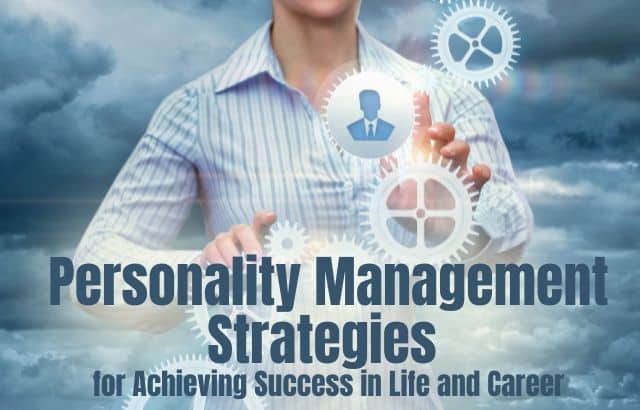Personality Management Strategies involve several key steps, including self-awareness, emotional regulation, communication skills, conflict resolution, time management, mindfulness, and self-care. Self-awareness is the first step in managing your personality, as it helps you understand your strengths and weaknesses. Emotional regulation involves managing your emotions in a healthy way, while effective communication is essential for managing your personality in social situations. Conflict resolution involves finding mutually beneficial solutions to conflicts, while time management helps you prioritize and use your time effectively. Mindfulness can reduce stress and increase self-awareness, while self-care involves taking care of yourself physically and emotionally. By implementing these strategies, you can manage your personality effectively and achieve personal growth.
In this competitive world, everybody needs to upgrade their profitability and effectiveness to accomplish their goals. Furthermore, Personal development is simply the best approach to comprehend and improve to amplify potential and to accomplish goals throughout everyday life. Investing your amounts of energy towards personal development can help you with improving each part of your life, recognizing differences, and accomplishing more than you have, says noted Strategist cum Business Astrologer Hirav Shah.
Table of Contents
Personality Management Strategies – Why do you need a plan?

Suppose you requested that a contractor construct your new house, and they said, “we needn’t bother with a plan, we’ll sort it out as we go.” You wouldn’t tolerate that briefly. So for what reason do so many of us carry on with life that way?
Your dreams are a higher priority in life. More often than not, we harbor aspirations and dream dreams, yet we infrequently pause and consider our future exhaustively. A personal development plan helps you realize where you’re going and how to arrive, with points of interest. To begin with, this will carry lucidity to your reasoning, and you’ll know precisely where you need to be. Furthermore, it will give you the true serenity that you’re going the correct way consistently. Endeavors will feel more purposeful and choices will be simpler, as you will have an unmistakable benchmark.
Hirav Shah says, “When you look at successful people, you will almost always discover a plan behind their success. It is the foundation for success.”
According to Hirav Shah, here are 9 personal development strategies that will assist you in making your life and career a grand success.
9 Personality Management Strategies for Success

Success in life and career often hinges on our ability to manage our personalities effectively. Understanding ourselves and how we interact with others can unlock doors to new opportunities, enhance our relationships, and ultimately lead to personal and professional fulfillment. Here are nine essential personality management strategies that can help you thrive in both areas.
1. Cultivate Self-Awareness

Self-awareness is the foundation of effective personality management. Understanding your strengths, weaknesses, and emotional triggers allows you to respond thoughtfully rather than react impulsively.
How to Enhance Self-Awareness:
- Journaling: Regularly write about your thoughts and feelings to gain clarity.
- Feedback: Seek constructive feedback from trusted friends or colleagues.
- Mindfulness Practices: Engage in meditation or mindfulness exercises to better connect with your emotions.
2. Personality Management Strategies- Develop Emotional Intelligence

Emotional intelligence (EQ) is the ability to recognize, understand, and manage your own emotions while empathizing with others. High EQ leads to better communication, conflict resolution, and relationship-building.
Tips to Boost Emotional Intelligence:
- Practice Empathy: Put yourself in others’ shoes to understand their perspectives.
- Reflect on Reactions: Analyze how your emotions affect your behavior in various situations.
- Manage Stress: Develop techniques such as deep breathing or exercise to maintain emotional control.
3. Personality Management Strategies-Enhance Communication Skills

Effective communication is key to successful interactions in both personal and professional settings. Clear and open communication fosters trust and collaboration.
Steps to Improve Communication:
- Active Listening: Focus entirely on the speaker, avoiding interruptions. Summarize what they’ve said to ensure understanding.
- Non-Verbal Cues: Be aware of body language and tone, both yours and others’.
- Clarity and Conciseness: Practice expressing your thoughts clearly and succinctly.
4.Personality Management Strategies-Embrace Adaptability

In today’s fast-paced world, adaptability is crucial. Being open to change and willing to adjust your approach can set you apart from others.
Ways to Enhance Adaptability:
- Stay Informed: Keep up with industry trends and changes to stay relevant.
- Flexibility Exercises: Challenge yourself by stepping out of your comfort zone regularly.
- Mindset Shift: View challenges as opportunities for growth rather than obstacles.
5. Build Positive Relationships

Strong relationships can significantly impact your career success and personal happiness. Investing in your connections is essential.
Strategies for Building Relationships:
- Networking: Attend industry events and engage in online professional communities.
- Offer Support: Be willing to help others, whether through mentoring or simple acts of kindness.
- Follow Up: Maintain connections by checking in with people regularly.
6. Practice Resilience

Resilience is the ability to bounce back from setbacks. Developing this trait can help you navigate life’s challenges more effectively.
Techniques for Building Resilience:
- Set Realistic Goals: Break larger goals into manageable steps to avoid feeling overwhelmed.
- Learn from Failure: Reflect on setbacks to identify lessons and avoid repeating mistakes.
- Maintain a Support System: Surround yourself with positive influences who uplift and encourage you.
7. Foster a Growth Mindset

A growth mindset is the belief that abilities and intelligence can be developed through dedication and hard work. This mindset fosters a love of learning and resilience.
How to Cultivate a Growth Mindset:
- Embrace Challenges: View challenges as opportunities for growth rather than threats.
- Value Effort: Recognize that effort leads to improvement and success.
- Seek Feedback: Use feedback as a tool for growth rather than criticism.
8. Set Clear Goals

Setting specific, measurable, achievable, relevant, and time-bound (SMART) goals can provide direction and motivation in your life and career.
Steps to Effective Goal Setting:
- Define Your Goals: Identify what you want to achieve personally and professionally.
- Create an Action Plan: Break down goals into actionable steps.
- Track Progress: Regularly review your goals and adjust your plans as necessary.
9. Maintain a Positive Attitude

A positive attitude can influence not only your outlook but also how others perceive you. Positivity attracts opportunities and fosters collaboration.
Ways to Cultivate Positivity:
- Practice Gratitude: Regularly reflect on what you’re thankful for to shift your focus to the positive.
- Surround Yourself with Positivity: Engage with people who uplift and inspire you.
- Limit Negativity: Minimize exposure to negative influences, whether they’re people or media.
Final Word

Hirav Shah concludes by saying, “A personal development plan is a very efficient method to assess your life, define what is really necessary for you, and start working on things that matter the most. Often in our life, we are so busy with day-to-day activities that we rarely have time for important thinking and planning.
Exercises like this can help you to get more clarity about goals that are the most important to you and to create realistic strategies for how you will achieve them.”
Hirav Shah, a renowned leadership expert, emphasizes the importance of personality management strategies in effective leadership. These strategies involve intentional actions and approaches that individuals can take to understand, control, and shape their own personalities. By improving self-awareness, emotional intelligence, communication skills, and adaptability, leaders can enhance their overall well-being and lead their teams more effectively.










